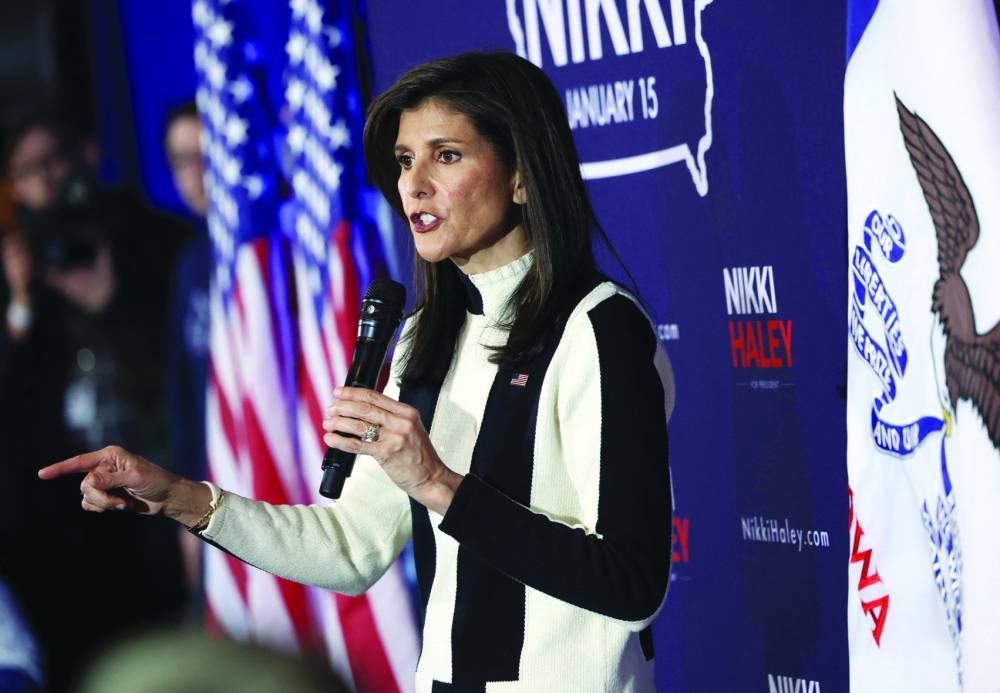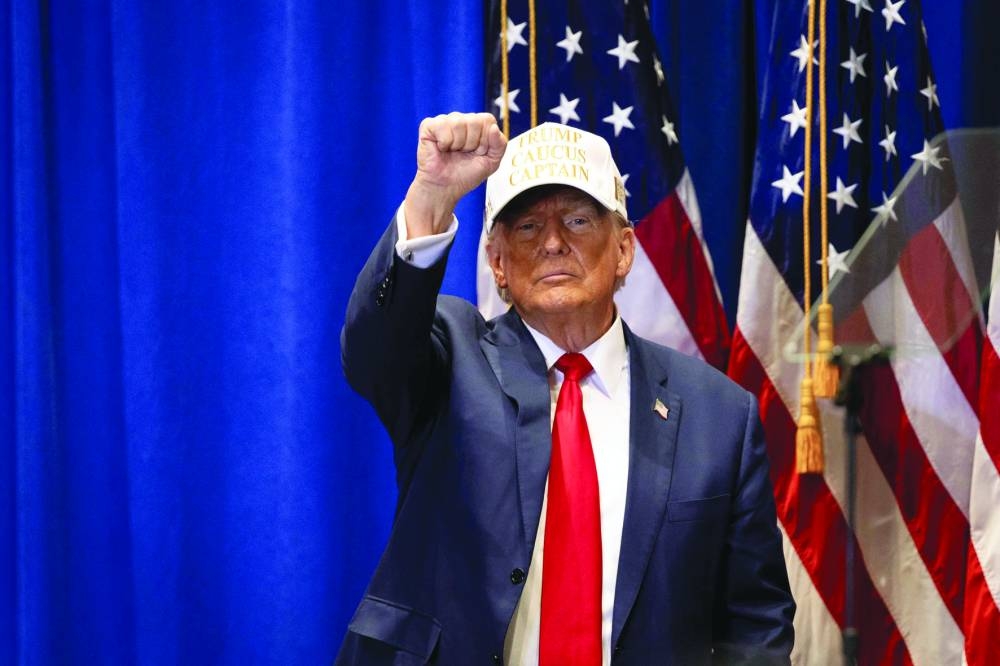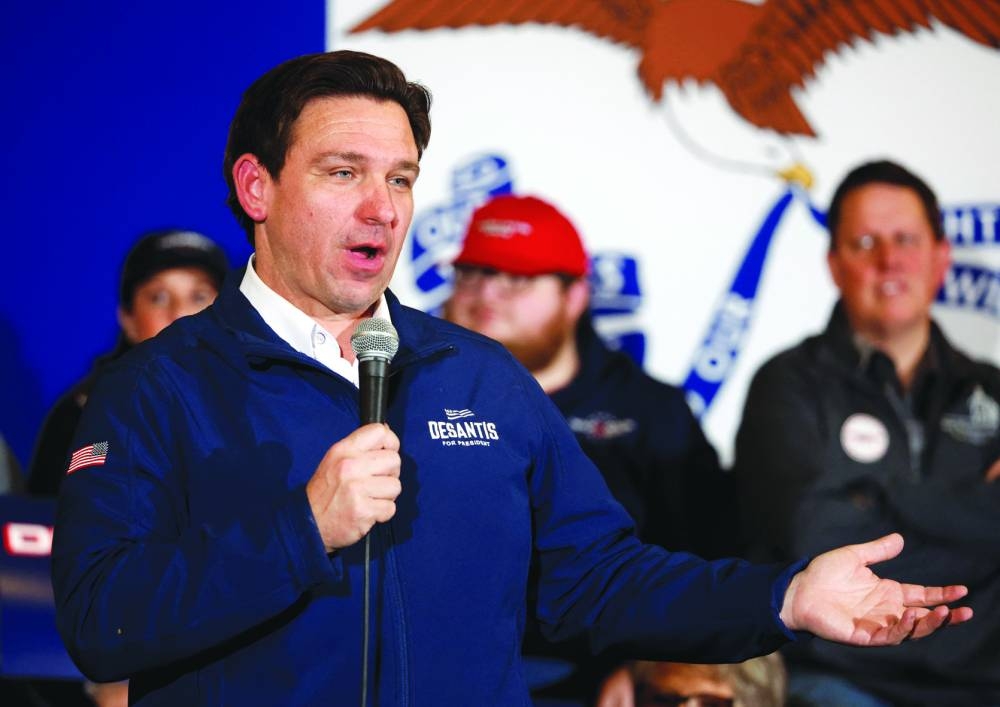Much of the United States remained gripped by an Arctic blast yesterday, cutting power to tens of thousands of customers in northern states and Texas and potentially dampening turnout in Iowa, where voters will cast the first ballots for a Republican candidate in November’s presidential race.
The dangerously frigid weather is expected to linger throughout the day, hitting the Midwest hardest but also sending snow and freezing rain across the Southern and Mid-Atlantic states, the US National Weather Service (NWS) said in a bulletin yesterday.
Temperatures in Iowa are expected to plummet to a life-threatening -35° Fahrenheit (-37° Celsius) at night.
Wind chills are forecast to dip as low as -58F (-50C) in states including Montana, South Dakota and North Dakota.
Thousands of flights within, into, and out of the United States were delayed or cancelled yesterday, with Denver International Airport and Chicago O’Hare International Airport experiencing the worst disruptions, according to flight-tracking website FlightAware.com
Power was restored in many places where the winter storm had knocked it out over the weekend, but as of midday yesterday, lights remained out for more than 100,000 customers in Oregon as well as tens of thousands in Texas, Pennsylvania, and Michigan, according to data from PowerOutage.US
The Electric Reliability Council of Texas (ERCOT) asked customers to conserve electricity from 6am-10am due to ongoing freezing temperatures, record-breaking demand and unseasonably low wind, and said similar conditions were expected on Tuesday.
The icy weather froze wells across the United States on Sunday, sending US natural gas output to a preliminary 11-month low while gas demand for heating and power generation skyrocketed.
In Iowa, voters kicked off the US Republican presidential nomination race yesterday with caucuses that would be the first major test of whether Nikki Haley and Ron DeSantis have any hope against scandal-plagued front-runner Donald Trump – or will have to accept cold political reality.
For the first time since he lost his 2020 re-election bid, the former United States president – who is being prosecuted in four criminal cases, ranging from taking top secret documents to trying to overthrow his election loss – will face voters.
Boasting a dominant lead in opinion polls, Trump is expected to win the Midwestern state’s first-in-the-nation contest handily as he bids to be the Republican standard-bearer against President Joe Biden in November.
However, observers have not ruled out a surprisingly strong showing by Haley or DeSantis.
“I’m asking you to go out, brave the cold and support me in the Iowa Caucus,” DeSantis posted on X, formerly Twitter, early yesterday. “You will never have an opportunity to have your vote make more of an impact than you will tonight!”
Trump, at a campaign event near Des Moines on Sunday, called for supporters to “dress warmly”.
“Brave the weather, go out, and save America,” he said.
“The biggest question I’m getting right now is: ‘Is the caucus still going to take place? There is going to be a polar vortex’,” warned Maci Arjes, part of a student Republican group at the University of Iowa.
Caucuses will begin from around 7pm (0100 GMT today), when voters gather in schools, libraries and fire stations across the state.
Unlike in regular elections, there is no confidential voting booth.
Instead, caucus participants demonstrate their choice by gathering at a designated spot in the room, along with other like-minded voters.
Trump plans to attend several of the caucuses over the evening, his campaign told AFP.
As the first-in-the-nation contest, Iowa has an outsized impact on the primary season, often setting momentum and media narratives ahead of the next states in the calendar.
Trump is expected to win easily, but the margin of his victory will be under immense scrutiny, with anything less than a crushing margin potentially denting the sense of inevitability that he has worked hard to create.
The latest NBC News/Des Moines Register/Mediacom poll put Trump at 48% among likely caucus-goers.
Haley, a former UN ambassador and South Carolina governor, surged into second place but was still only at 20%, while Florida Governor Ron DeSantis scored 16%.
The Republican primary also features a number of low-polling candidates, including biotech entrepreneur Vivek Ramaswamy.
Caucuses are being held by Iowa’s Democrats, along with voting by mail until March. That process, however, is all but set, with Biden seeking a second term.
Biden, whose campaign announced yesterday that it had raised more than $97mn in the fourth quarter of 2023 and now has a record-breaking war chest of $117mn, faces no serious threat from his two Democratic challengers – self-help author Marianne Williamson and Minnesota congressman Dean Phillips.

Nikki Haley speaks during a campaign event at Jethro's BBQ in Ames, Iowa.

Donald Trump raises his fist at a 'Commit to Caucus' event at Simpson College in Indianola, Iowa.

DeSantis speaks at a campaign event ahead of the Iowa caucus vote in Ankeny, Iowa.
